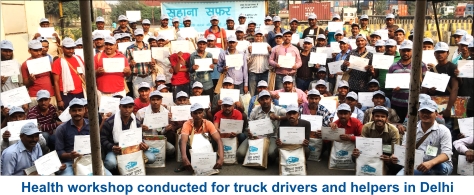|
Capacity Building in the
Logistics Sector
Logistics
sector is a very important sector as it supports almost all industrial
activities. However, considering its importance and size, it is usually
not given the attention it deserves. The logistics value chain consists
of three segments - transportation, warehousing and value-added
services. Skill requirements for each of the segments differs
significantly.
 The
logistics sector, currently is highly unorganised, leading to high level
of complexity in the supply chain and problems of unskilled labour,
undecided roles and lack of process-driven systems. Poor working
conditions, low pay scales relative to alternate careers, poor or
non-existent manpower policies and existence of unscrupulous practices
have added to the sector's woes, creating the image of a segment that
holds few fascinations for those seeking employment. There is a dire
need to change social perceptions when it comes to logistics. While
skill issues exist in varying degrees in all segments of the logistics
sector, the most severe and immediate requirement for skill development
is found to be in the road freight and warehousing segments. The road
freight industry in India is worth about INR 1.42 trillion and is
growing at about 6-8 percent per year . Road transport contributes
almost 90% of the countries’ passenger traffic and 65% of the freight
traffic. According to the Ministry of Road Transport and Highways, 21
per cent of the total accidents in the year 2017 were accounted by heavy
vehicles including trucks. The truck drivers are most affected due to
long working hours, poor sanitation, poor food standards and poor pay
packets. Ramanujam, CEO, Logistics Sector Skill Council, highlights,
“The logistics sector in India has not had the benefit of any structured
training for the entry level work force. All training has been ‘on-job’
resulting in inefficiencies. By optimising the skills of the labour
force, we can make a positive change of up to 12 percent in the bottom
line.” The
logistics sector, currently is highly unorganised, leading to high level
of complexity in the supply chain and problems of unskilled labour,
undecided roles and lack of process-driven systems. Poor working
conditions, low pay scales relative to alternate careers, poor or
non-existent manpower policies and existence of unscrupulous practices
have added to the sector's woes, creating the image of a segment that
holds few fascinations for those seeking employment. There is a dire
need to change social perceptions when it comes to logistics. While
skill issues exist in varying degrees in all segments of the logistics
sector, the most severe and immediate requirement for skill development
is found to be in the road freight and warehousing segments. The road
freight industry in India is worth about INR 1.42 trillion and is
growing at about 6-8 percent per year . Road transport contributes
almost 90% of the countries’ passenger traffic and 65% of the freight
traffic. According to the Ministry of Road Transport and Highways, 21
per cent of the total accidents in the year 2017 were accounted by heavy
vehicles including trucks. The truck drivers are most affected due to
long working hours, poor sanitation, poor food standards and poor pay
packets. Ramanujam, CEO, Logistics Sector Skill Council, highlights,
“The logistics sector in India has not had the benefit of any structured
training for the entry level work force. All training has been ‘on-job’
resulting in inefficiencies. By optimising the skills of the labour
force, we can make a positive change of up to 12 percent in the bottom
line.”
 Understanding
that the truck drivers and helpers are mostly on road, it was observed
that despite being in the profession of driving, they have almost no
knowledge or minimal knowledge of road safety pointers and traffic
rules, norms and regulations, which often leads to irresponsible
driving. Suhana Safar programme is one of its kind capacity building
initiative towards skilling supply chain and is especially designed by
the Development Alternatives Group to eliminate most of the significant
challenges faced by truck drivers and their helpers’ community including
their families and transport executives in India. Contributing to
sustainable development goals, the aim of this programme is to help
containerised truck drivers and helpers to bring about changes in their
everyday lives, and subsequently make them more productive and efficient
in their work by improving their quality of life by enhancing their
Knowledge, Skills and Attitudes (KSAs). The programme caters to the
target audience in two ways. Firstly, by means of training and capacity
building on WASH (Water Sanitation Health and Hygiene) and road safety
and secondly through awareness programmes on various components like
drug abuse, alcoholism, HIV/AIDS, general sanitation and hygiene
practices etc. Understanding
that the truck drivers and helpers are mostly on road, it was observed
that despite being in the profession of driving, they have almost no
knowledge or minimal knowledge of road safety pointers and traffic
rules, norms and regulations, which often leads to irresponsible
driving. Suhana Safar programme is one of its kind capacity building
initiative towards skilling supply chain and is especially designed by
the Development Alternatives Group to eliminate most of the significant
challenges faced by truck drivers and their helpers’ community including
their families and transport executives in India. Contributing to
sustainable development goals, the aim of this programme is to help
containerised truck drivers and helpers to bring about changes in their
everyday lives, and subsequently make them more productive and efficient
in their work by improving their quality of life by enhancing their
Knowledge, Skills and Attitudes (KSAs). The programme caters to the
target audience in two ways. Firstly, by means of training and capacity
building on WASH (Water Sanitation Health and Hygiene) and road safety
and secondly through awareness programmes on various components like
drug abuse, alcoholism, HIV/AIDS, general sanitation and hygiene
practices etc.
Over a period of two years, this programme
has impacted more than 7000 truck drivers in 3 states of India,
contributing towards the overall well-being of the transport community.
■
Tanvi Arora
tarora@devalt.org
Reference
KPMG analysis report
Back to Contents
|
 The
logistics sector, currently is highly unorganised, leading to high level
of complexity in the supply chain and problems of unskilled labour,
undecided roles and lack of process-driven systems. Poor working
conditions, low pay scales relative to alternate careers, poor or
non-existent manpower policies and existence of unscrupulous practices
have added to the sector's woes, creating the image of a segment that
holds few fascinations for those seeking employment. There is a dire
need to change social perceptions when it comes to logistics. While
skill issues exist in varying degrees in all segments of the logistics
sector, the most severe and immediate requirement for skill development
is found to be in the road freight and warehousing segments. The road
freight industry in India is worth about INR 1.42 trillion and is
growing at about 6-8 percent per year . Road transport contributes
almost 90% of the countries’ passenger traffic and 65% of the freight
traffic. According to the Ministry of Road Transport and Highways, 21
per cent of the total accidents in the year 2017 were accounted by heavy
vehicles including trucks. The truck drivers are most affected due to
long working hours, poor sanitation, poor food standards and poor pay
packets. Ramanujam, CEO, Logistics Sector Skill Council, highlights,
“The logistics sector in India has not had the benefit of any structured
training for the entry level work force. All training has been ‘on-job’
resulting in inefficiencies. By optimising the skills of the labour
force, we can make a positive change of up to 12 percent in the bottom
line.”
The
logistics sector, currently is highly unorganised, leading to high level
of complexity in the supply chain and problems of unskilled labour,
undecided roles and lack of process-driven systems. Poor working
conditions, low pay scales relative to alternate careers, poor or
non-existent manpower policies and existence of unscrupulous practices
have added to the sector's woes, creating the image of a segment that
holds few fascinations for those seeking employment. There is a dire
need to change social perceptions when it comes to logistics. While
skill issues exist in varying degrees in all segments of the logistics
sector, the most severe and immediate requirement for skill development
is found to be in the road freight and warehousing segments. The road
freight industry in India is worth about INR 1.42 trillion and is
growing at about 6-8 percent per year . Road transport contributes
almost 90% of the countries’ passenger traffic and 65% of the freight
traffic. According to the Ministry of Road Transport and Highways, 21
per cent of the total accidents in the year 2017 were accounted by heavy
vehicles including trucks. The truck drivers are most affected due to
long working hours, poor sanitation, poor food standards and poor pay
packets. Ramanujam, CEO, Logistics Sector Skill Council, highlights,
“The logistics sector in India has not had the benefit of any structured
training for the entry level work force. All training has been ‘on-job’
resulting in inefficiencies. By optimising the skills of the labour
force, we can make a positive change of up to 12 percent in the bottom
line.”  Understanding
that the truck drivers and helpers are mostly on road, it was observed
that despite being in the profession of driving, they have almost no
knowledge or minimal knowledge of road safety pointers and traffic
rules, norms and regulations, which often leads to irresponsible
driving. Suhana Safar programme is one of its kind capacity building
initiative towards skilling supply chain and is especially designed by
the Development Alternatives Group to eliminate most of the significant
challenges faced by truck drivers and their helpers’ community including
their families and transport executives in India. Contributing to
sustainable development goals, the aim of this programme is to help
containerised truck drivers and helpers to bring about changes in their
everyday lives, and subsequently make them more productive and efficient
in their work by improving their quality of life by enhancing their
Knowledge, Skills and Attitudes (KSAs). The programme caters to the
target audience in two ways. Firstly, by means of training and capacity
building on WASH (Water Sanitation Health and Hygiene) and road safety
and secondly through awareness programmes on various components like
drug abuse, alcoholism, HIV/AIDS, general sanitation and hygiene
practices etc.
Understanding
that the truck drivers and helpers are mostly on road, it was observed
that despite being in the profession of driving, they have almost no
knowledge or minimal knowledge of road safety pointers and traffic
rules, norms and regulations, which often leads to irresponsible
driving. Suhana Safar programme is one of its kind capacity building
initiative towards skilling supply chain and is especially designed by
the Development Alternatives Group to eliminate most of the significant
challenges faced by truck drivers and their helpers’ community including
their families and transport executives in India. Contributing to
sustainable development goals, the aim of this programme is to help
containerised truck drivers and helpers to bring about changes in their
everyday lives, and subsequently make them more productive and efficient
in their work by improving their quality of life by enhancing their
Knowledge, Skills and Attitudes (KSAs). The programme caters to the
target audience in two ways. Firstly, by means of training and capacity
building on WASH (Water Sanitation Health and Hygiene) and road safety
and secondly through awareness programmes on various components like
drug abuse, alcoholism, HIV/AIDS, general sanitation and hygiene
practices etc.